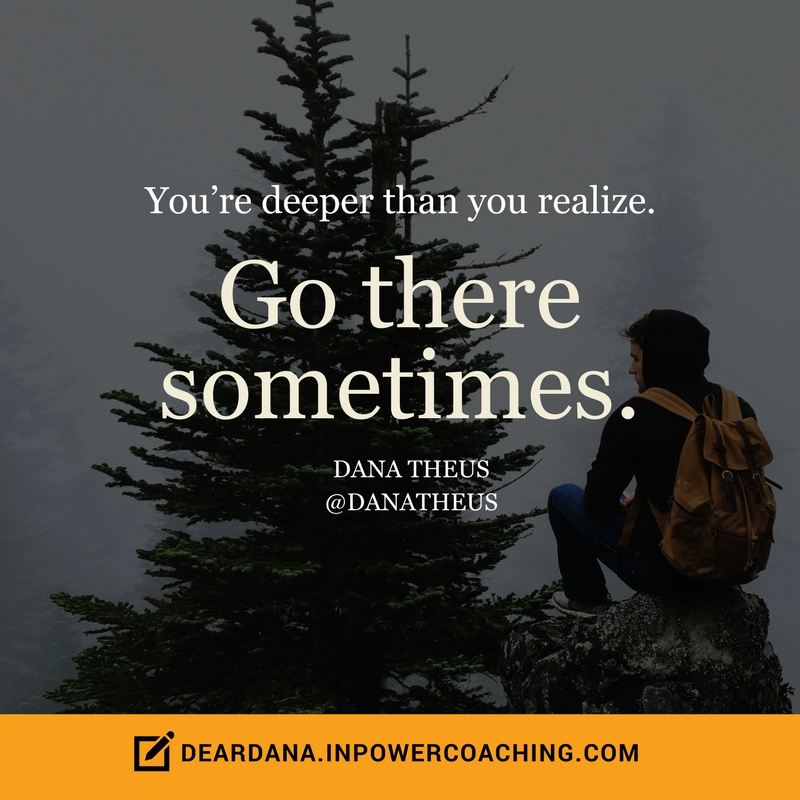Welcome to “Dear Dana”, our regular column to give you career and workplace advice/coaching. Please write in and tell me about a career challenge or frustration you’re facing at the office! – Dana Theus
Dear Dana,
Last year I got rejected for a transfer in my company that I applied for. I was proud of myself for going to the team leader who rejected me (and who I’ve known outside work for a few years) to ask why they turned me down. He told me that the person they chose had more relevant experience and that it wasn’t a rejection of me as much as a decision to hire the exact skills they needed. I was okay with that but then he said something else that confused me. He said I should be more confident in my interview. He said “I know you. You’re more than what you do. Be sure that comes out when you interview.” I didn’t really think to ask him what he meant when he said it, but afterwards that comment stuck with me and I don’t think I understand what he meant. On one of your recent webinars I heard you and Shira say this too. “You’re more than what you do.” So I thought I’d ask you to explain because I don’t think I’m getting it and I need some interview advice for another opportunity I’m applying for. – Confused in Connecticut
Dear Confused, THANK YOU for asking this question. I have to admit that I didn’t always understand this idea either. Earlier in my career I also thought my value was only a function of my skills, capabilities and accomplishments. It frankly wasn’t until I became a coach that I really tapped into the wisdom of this, and now I try to help all my clients dig down to understand their value beyond the “basics” you can easily bullet list on a resume. Appreciating these “more than what you do” aspects of your value is a critical first step to being intentional about your personal brand, too, so thank you for giving me the opportunity to break it out.
You know there’s more to you than just what you can do at work, but if you’re like I was, you don’t understand how those other parts of you bring value to your employer. Once you understand the employer value pieces, and incorporate them into your professional brand identity, you’ll be able to “bring them to your interview” and stand out from other candidates because of it. So, let’s look at some of the obvious places, and maybe we can continue the discussion in the forums because everyone should have an appreciation for their personal brand values beyond just what they can produce.
TALENT
I have a client who has a team member that drives her nuts. She could talk for a long time about how often this person drops a ball. However, she’s also aware of several key talents the person has for account management and troubleshooting some of the most difficult relationships the company has to manage with large customers. This might show up on a resume as “relationship management,” but my client describes the person’s talent as “almost magical the way they can soothe the savage beast.” To my client (the person’s boss) this talent, which she describes more as a “relationship whisperer,” is extremely important to helping meet revenue goals that involve losing large contracts.
The problem is that this person doesn’t fully appreciate the financial value to the company of their “relationship whisperer” talents. The person thinks their value is just that they’re well-liked (I guess assuming that if people like them, they like the company?). They also don’t appreciate that they have to be able to do other things that deliver value to the company and that they need to expand their personal brand reputation to being a “relationship whisperer who exceeds revenue goals.” I’m coaching my client through trying to help this person become more appreciative of why their relationship whispering talents are valuable to help them use these talents and also learn new skills that will allow them to add “revenue generator” to their personal brand to be the complete package.
Shira calls these almost-magical talents “superpowers” for a reason. It’s great advice to take your superpowers to your interview!
PASSION
Here’s some starter interview advice: What do you enjoy doing most? How do you bring that interest to work? How does it help you produce results? When you get clear on these things you’ll learn to speak about your passions in ways employers can appreciate.
I had a client once who had a real passion for sustainability issues. Her long-term goal was to work for a “green” company. But her passion initially led her to manage a volunteer working group on how the company could reduce their waste and carbon footprints. Although her “day job” was in marketing, this “volunteer” sustainability leadership put her in proximity to the CEO who learned to appreciate her skills (the ones I was helping her develop!) for gaining consensus among senior executives. The CEO asked her more than once to play a lead role in several executive-level marketing initiatives because he knew she could be successful leading the executive team to a decision. This raised her visibility in the marketing group too, and helped her get a small promotion.
I was glad to help her gain this visibility, but her passion really folded into her personal brand fully during a job search later where she was able to use this experience to demonstrate during interviews to a new green employer:
- How her passion, interest and experiences in sustainability were genuine
- That she could perform and deliver results beyond her immediate responsibility
- How she could influence at levels beyond her job title (i.e., that she had “boardroom presence”)
You may have passion for things that seem disconnected to your job, but when you take a step back, you can usually find some threads to pull them together when you look at them through the right lens. You can use your personal goals to help you do this.
PERSONAL GOALS
You probably have personal goals totally unrelated to your employer or career. I encourage you to find some that align strongly with your employer’s interests and make sure those are on your professional development plan. You want to do this for reasons related to your current job and for future jobs as well.
In your current job, you’ll personally be more motivated if you see what portion of your job is refining skills and abilities that will help you get to your future career goals faster and with more confidence. Your experience today helps you prepare for tomorrow, so be intentional about it. Also, let your boss in on those personal goals you have that s/he can help you develop (because it benefits the team, too.) Another client of mine was pleased to find that after she told her boss about some of her personal goals (managing more people, for example), her boss started sending her projects that were more aligned with her desires and is giving her a new direct report to help her fulfill her desires. You never know until you ask whether there is more your boss/company can do to help you achieve your goals.
[hide_from visible_to=”public”]
How do your goals benefit the company? Primarily, your boss needs to know what you’re most motivated to do and what might lead you to overachieve. In an interview you need to find out if your goals and the team’s goals are aligned enough for you to feel fulfilled at that job. When you see alignment, you can genuinely let your interviewer know that you really are able to get behind the team’s goals because they’re personally important to you. When they see that you make a personal connection to the company goals it is a strong point in your favor.
CULTURE FIT
During an interview, part of your goal is to learn more about how your talents, passions and goals fit (or don’t fit) with the organization you’re thinking about joining. A good interviewer will also want to know this. Even a bad interview will feel the synergy if you’re good at communicating your personal brand in ways that make the presence of a good culture fit obvious.
The point is that you need to understand and appreciate these things about yourself first, before you can communicate them effectively during an interview. This is hard for most of us (really, even coaches can find this challenging.) And helping you see yourself and your value beyond what you put on your weekly status reports is something that coaches are typically really good at. If you know you need a clearer view of yourself “beyond what you do,” why not talk to a coach?
Because it’s true. You are much much more than what you do and when you help a potential employer understand it you can reap the rewards in both personal fulfillment and compensation.
————–
Have interviews coming up? Download free job interview advice and offer negotiation guidance to help you get a raise in your lifetime income!
Need help writing your accomplishments for your resume or LinkedIn profile? Download our worksheet for tips, fill-in-the-blank guidance and examples! Get a BONUS personality assessment too!








